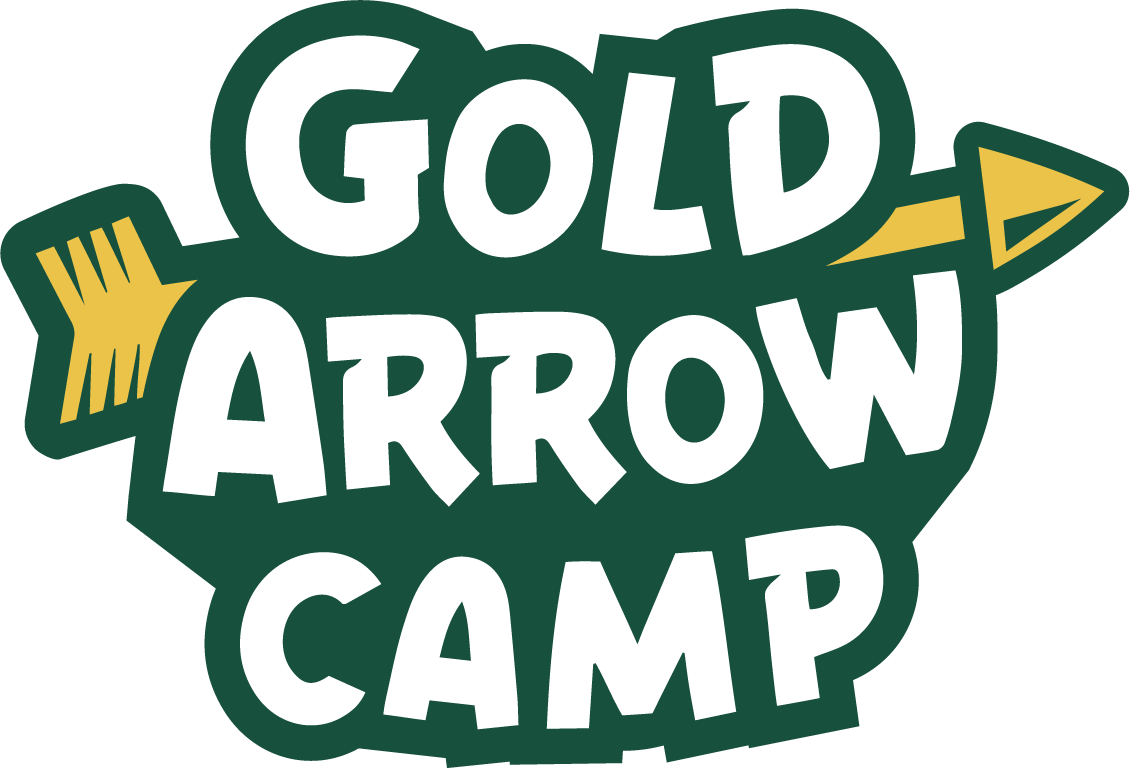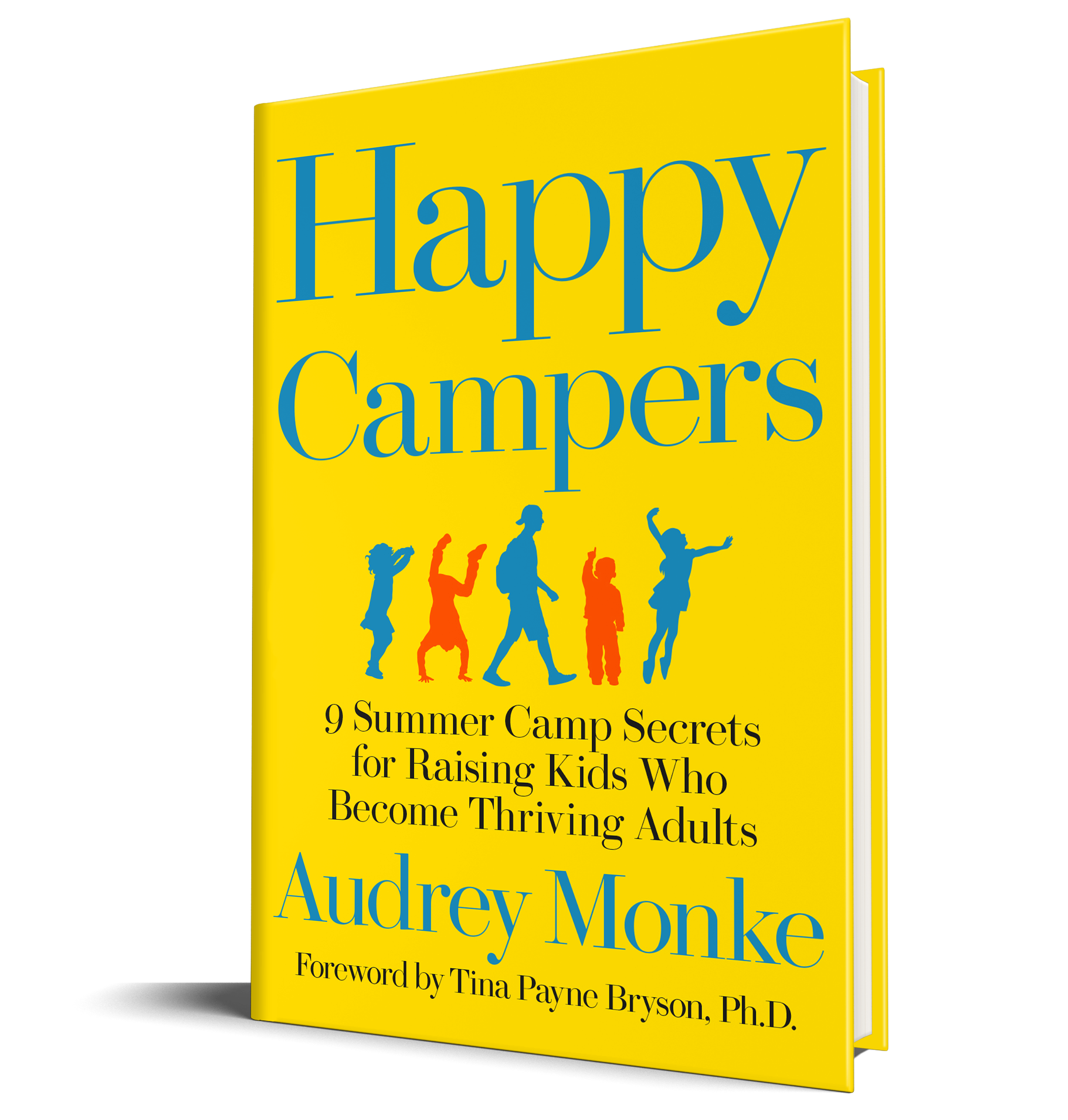Episode 87: Experienced Campers Talk about Camp
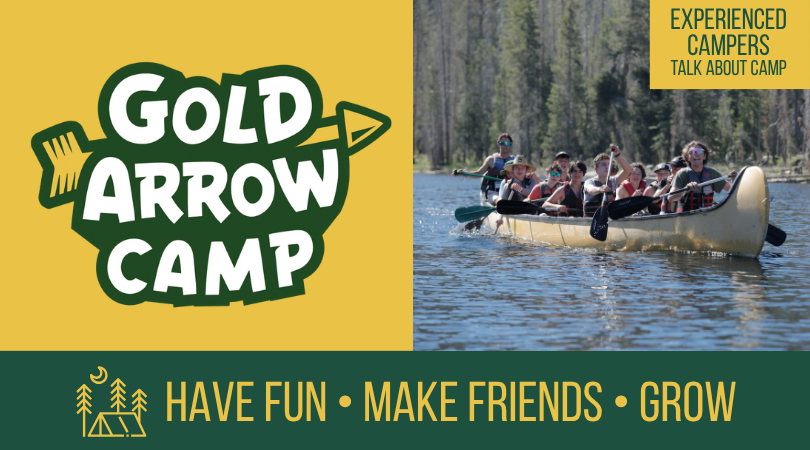
For parents and campers who are new to Gold Arrow Camp, you won’t want to miss this episode! A group of Junior Counselors (16 & 17 year old experienced campers) join Sunshine for a chat about their experiences and growth over their summers at camp. This was recorded in 2018 but their insights are still as relevant today!
Podcast: Play in new window | Download
Subscribe: Spotify | Email | RSS
Episode 86: Thrivers with Dr. Michele Borba
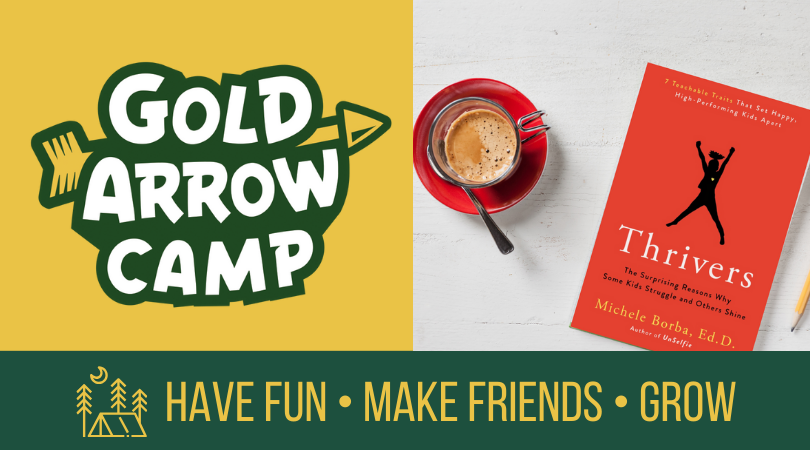 This episode was originally published on Sunshine Parenting and is geared towards parents, staff, and older campers. There are mentions of youth mental health issues, including suicide, so parents please listen before deciding whether to share with your younger kids.
This episode was originally published on Sunshine Parenting and is geared towards parents, staff, and older campers. There are mentions of youth mental health issues, including suicide, so parents please listen before deciding whether to share with your younger kids.
Join Sunshine for her conversation with Dr. Michele Borba about her phenomenal, must-read book THRIVERS: The Surprising Reasons Why Some Kids Struggle and Others Shine – 7 Teachable skills of heart, mind, & will that set happy, healthy, high-performing kids apart.
At GAC, our vision is Creating a happier world, one camper at a time. Our mission – what we specifically focus on – is building positive habits and character traits for a thriving life. We follow the research about what kids need to thrive now and into adulthood. The book Thrivers is a great resource for all of our staff and parents.
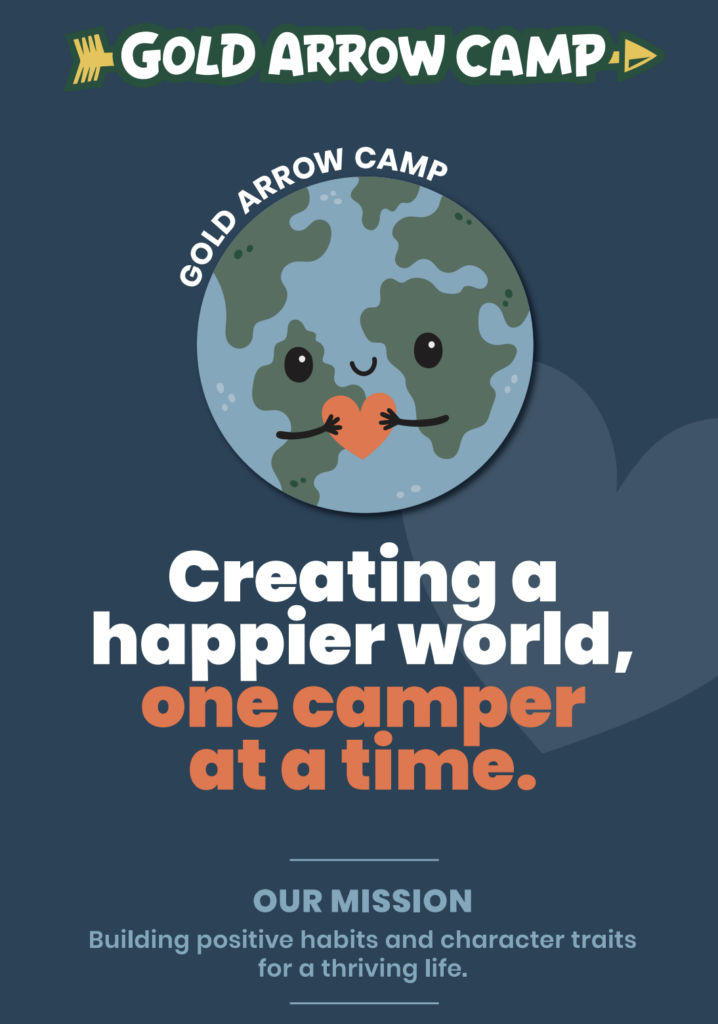
About Dr. Michele Borba
Dr. Michele Borba is an educational psychologist, best-selling author, and TODAY show contributor who has spoken to over one million participants on five continents and to countless media about child development issues.
She blends 40 years of teaching and consulting experience with latest science to offer sound, realistic advice to parents teachers and child advocates about helping children thrive.
Sunshine’s Amazon Review
Dr. Michele Borba’s latest book – THRIVERS: The Surprising Reasons Why Some Kids Struggle and Other Shine – is perhaps her most important book yet – and the timing couldn’t be better. She’s researched seven specific character traits that parents and educators can focus on teaching kids to help them be resilient “thrivers” in a time when many children and adolescents are NOT thriving. The book is divided into three parts (Nurturing Heart, Developing Mind, and Cultivating Will) and each section has two or three specific character traits outlined in detail. Not only does Dr. Borba shares stories and research backing the importance of teaching kids the trait, but she also provides specific age-by-age ideas about how to instill each trait. This book needs to be on every parent and educator’s bookshelf and can be read one chapter at a time (if you want to focus on one trait) or all at once. With youth mental health and suicide rates rising, we all need to stop and reflect on what’s most important to teach our kids. And it’s not math or grammar or athletic skills. Instead, it’s the specific character traits that will help kids excel in all areas. Pick up Thrivers and learn how to teach kids self-confidence, empathy, self-control, integrity, curiosity, perseverance, and optimism — all traits that are teachable and lead to a thriving life.
Resources/Related
7 Essential Character Traits PDF
Thrivers book info & video series
[ENCORE] Ep. 138: Unselfie with Dr. Michele Borba
Podcast: Play in new window | Download
Subscribe: Spotify | Email | RSS
Episode 85: Unplug to Connect

Unplug to Connect
One of our core values at GAC is Unplugging to Connect. Why are we so passionate about the importance of getting off our screens and spending more time in face-to-face interactions? Because it’s good for all of our well-being to improve the quality of our relationships and connection to our families, friends, and communities. We want our campers and staff to experience the positive difference it makes being in a screen-free environment, so that they are compelled to change their own screen habits. The big dream – the one that serves our vision of creating a happier world, is that we go out from our camp community and help bring positive collective action and change to how we all prioritize face-to-face connection outside of camp.
There is now a lot of research-backed evidence about the negative impact excessive screen time is having on people across all generations. Excessive screen time is linked to negative impacts on mental and physical health, with children and teens particularly vulnerable. These impacts include increased anxiety and depression, sleep disturbances, obesity, and reduced cognitive function. The effects can also include behavioral problems, difficulty with social skills, and issues with academic performance.
According to research by Jean Twenge (iGen: Why Today’s Super-Connected Kids Are Growing Up Less Rebellious, More Tolerant, Less Happy — and Completely Unprepared for Adulthood):
After 1 h/day of use, more hours of daily screen time were associated with lower psychological well-being, including less curiosity, lower self-control, more distractibility, more difficulty making friends, less emotional stability, being more difficult to care for, and inability to finish tasks. Among 14- to 17-year-olds, high users of screens (7+ h/day vs. low users of 1 h/day) were more than twice as likely to ever have been diagnosed with depression (RR 2.39, 95% CI 1.54, 3.70), ever diagnosed with anxiety (RR 2.26, CI 1.59, 3.22), treated by a mental health professional (RR 2.22, CI 1.62, 3.03) or have taken medication for a psychological or behavioral issue (RR 2.99, CI 1.94, 4.62) in the last 12 months. Moderate use of screens (4 h/day) was also associated with lower psychological well-being.
Associations between screen time and lower psychological well-being among children and adolescents: Evidence from a population-based study, Dr. Jean Twenge
”Play-based childhood has been replaced by a screen-based childhood and the outcomes of this experiment are a nightmare – least flourishing generation in history.”
Jonathan Haidt
Jonathan Haidt’s The Anxious Generation: How the Great Rewiring of Childhood Is Causing an Epidemic of Mental Illness (2024) presents a compelling argument about the rise in youth anxiety and mental health issues, particularly in the United States and other Western countries. He shares the research about how a play-based childhood became replaced by a phone-based childhood and how detrimental the change has been for children’s mental, physical, and social health.
Around 2010–2015, most teens got smartphones and social media became central to their social lives. Platforms like Instagram, TikTok, and Snapchat are designed to be addictive and encourage social comparison, validation seeking, and fear of missing out (FOMO). Rates of anxiety, depression, self-harm, and suicide have skyrocketed among teens—especially girls—since the early 2010s. Haidt links this surge directly to increased screen time, especially social media use.
We all feel the difference in how smart phones seemed to have taken over all of our lives. There’s now an eery quiet in places that used to be boisterous (school buses, school lunch/recess at schools where phones are allowed). Many of us notice the lack of eye contact and social connections in places where we used to have chats with strangers, such as while waiting in line for a coffee or passing someone on the sidewalk.
Specific adverse effects of screen use on well-being include:
Mental: social media makes it harder to focus / learn / work – read a book, solve a difficult problem
Emotional: social media/screen time causing increased depression, anxiety
Physical: screen time linked to less sleep, less physical activity, more obesity
Social: isolation/loneliness, less practice with social skills leading to more relational challenges, in new/awkward situations, people all retreat to their phones, lessening the chance of connection
Spiritual: Reduced ability to meditate/pray when attention fragmented
Overall, the biggest issue with screen use is what we’re NOT doing when we’re spending hours on our phones and other screens. We’re not:
Spending time with friends
Doing outdoor activites
Participating in hobbies we enjoy / make us feel good
The good news is that experimental studies show that reducing screen time leads to increased happiness and focus within weeks. That’s where camp comes in.
Benefits of Being Unplugged
Gold Arrow Camp offers a unique experience – to be in a community and among people who are collectively unplugged. Time unplugged at camp gives campers and staff the unique opportunity to experience how good they feel when they’re not stuck in the addictive cycle of phone-use caused by apps that use manipulative algorithms to keep their attention.
At camp, we spend time that was once spent on screens on other things that improve well-being, including:
Building Social Connections
More face-to-face time in real-life relationships gives campers the opportunity to form deeper connections (REALationships) with the people they are with. They experience being present with people who are focused and attentive to them, not distracted by phones. Meals, campfires, walking time, and hang-out time are all opportunities for face-to-face connection.
Getting Great Sleep
We prioritize getting good sleep at GAC with our campers getting a minimum of 9 hours of in-bed time (our oldest campers lights out is 10pm and wake up time is around 7am). Not having screens around allows for great sleep.
Discovering New Skills & Hobbies
In addition to learning and doing many fun recreational outdoor activities, campers learn card games, read, journal, play guitar, make friendship bracelets or other crafts, and make some new best friends…The opportunities for growth and discovery are endless when we’re not distracted by screens! Campers experience improved focus and productivity and the ability to be present and get fully engaged with what they are doing in the moment.
More Resources to Explore
Books:
Happy Campers: 9 Summer Camp Secrets for Raising Kids Who Become Thriving Adults, Audrey Monke
The Anxious Generation, Jonathan Haidt
TED Talks:
iGen: The Smartphone Generation | Jean Twenge | TEDxLagunaBlancaSchool
Are Smartphones Ruining Childhood? | Jonathan Haidt | TED
Other:
Podcast: Play in new window | Download
Subscribe: Spotify | Email | RSS
Episode 84: Try Something New
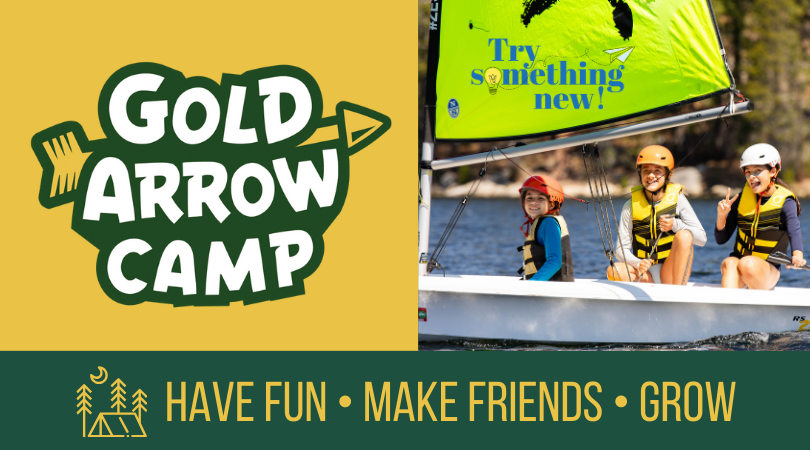
Join Sunshine, Chelster, Airborne, and Punkie as they discuss their favorite camp activities, trying new things, and getting outside our comfort zones at GAC. This year’s summer theme is Try Something New, so it’s a great summer to really lean into our value of getting outside our comfort zone!
We chose this year’s summer theme, Try Something New, because we want our 2025 campers to challenge themselves to get outside their comfort zones and try new activities and experiences while at camp. For our first-time campers, coming to camp is a great example of Trying Something New!
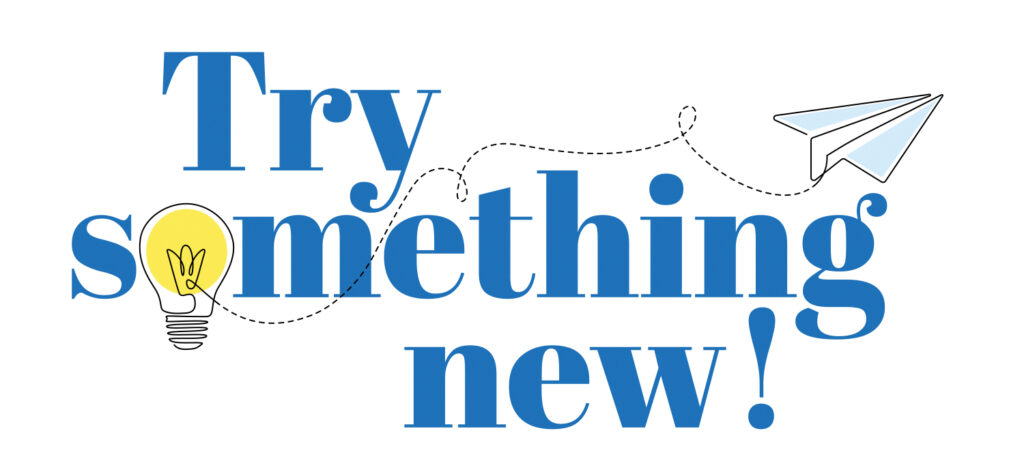
At GAC this summer, we’ll practice setting goals and taking safe risks by trying new things. And we’ll encourage and cheer each other on while doing so. We want all of our campers to build confidence in their abilities and to understand that it’s normal to feel some discomfort when trying new things.
Our “Try Something New” theme builds on the work we’ve done with campers over the past few years as we’ve talked about getting outside our comfort zones, putting fear in the backseat, and challenging ourselves to try new things.
We’ve noticed more campers in recent summers who are hesitant to try camp activities they haven’t done before, and we want campers to experience the increased fun and confidence that comes with learning and practicing new skills. It is our sincere hope that our 2025 GAC campers will take this theme to heart and continue to explore new activities and grow confidence outside of camp.

During the summer, we’ll talk with campers about all the different ways they can TRY SOMETHING NEW at camp, including:
- Trying an activity they’ve never done before, like water skiing or rock climbing.
- Trying a new food or salad bar item.
- Practicing a new friendship skill, like introducing themselves to someone they haven’t met or asking a friend three questions to get to know them better.
- Challenging themselves to build a new skill in an activity they’ve done before. For example, they might try sailing a bigger boat this summer or signing up for the Will-O sailing trip.
- Learning a new camp dance (like “Tragedy” or “Foot Loose”).
- Overcoming a fear of heights by going up on the ropes course or zipline.
- Overcoming a fear of speaking or being in front of a large group by singing a song with their cabin group or acting in a skit at Big Campfire.
- Telling their cabin mates a story around the campfire.
- Reading a book (if they don’t normally read for fun) or reading a book in a different genre than what they usually read.
- Learning a new craft or hobby, like crocheting, juggling, or guitar, by signing up for a free time activity that you’ve never done before or learning from a friend.
- Starting a gratitude journal or a journal about what you’re doing at camp.
Facing challenges, acknowledging big emotions, overcoming discouragement and frustrations, and learning how to get comfortable pushing ourselves to try new things are all skills that help us – and our kids – grow our resilience and our confidence. These are traits that will help our campers thrive both at camp and in life!
Podcast: Play in new window | Download
Subscribe: Spotify | Email | RSS
Episode 83: Creating a Happier World with Woody

Chuck “Woody” Radke’s GAC story began in 1990 and continues to 2025. His wife “Tahoe” (Assistant Director) and son Will (Junior Counselor) will join him at Gold Arrow Camp this summer. Woody interviewed many alumni and authored the amazing Sierra Summers book about the history of Gold Arrow Camp. He has many insights about the impact of GAC on every generation of campers and staff.
Podcast: Play in new window | Download
Subscribe: Spotify | Email | RSS
Episode 82: Creating a Happier World with Glitter
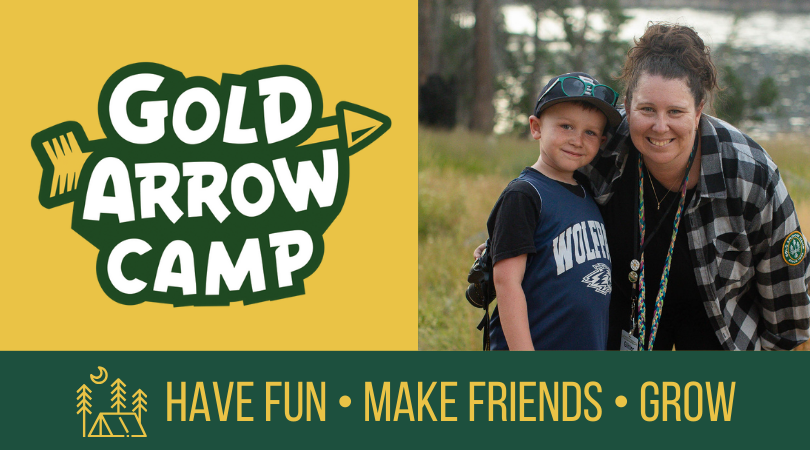
In this episode, Audrey “Sunshine” Monke chats with Amy “Glitter” Bolton about her long career as a year-round GAC staff member serving as our Office Manager and Registrar. Glitter’s is the friendly voice most parents hear when they call the GAC office. Glitter’s GAC story started in 2001, when she joined our staff as an Office Assistant. Her six-year-old son Turner joined his mom at camp for the first time last summer.
Podcast: Play in new window | Download
Subscribe: Spotify | Email | RSS
Episode 81: Creating a Happier World with Evergreen

In this episode, Audrey “Sunshine” Monke chats with Becky “Evergreen” Johnson about the impact Evergreen’s time as a staff member and parent have impacted her life and her career. Evergreen’s GAC story started in 1995 (30 years ago!), when she joined our staff as a Group Counselor. This summer (2025), Evergreen will be serving as a Staff Coach during staff training week (we call it “Tweek”) and Session 1.
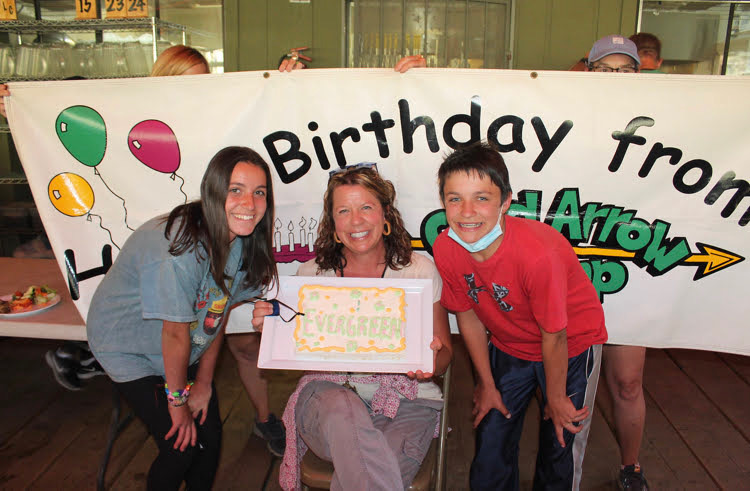
Podcast: Play in new window | Download
Subscribe: Spotify | Email | RSS
Episode 80: The Magic of Camp (Happy Campers Book Excerpt)

This week on the podcast we’re featuring a short excerpt from the introduction to Audrey “Sunshine” Monke’s book, Happy Campers: 9 Summer Camp Secrets for Raising Kids Who Become Thriving Adults.
Learn about the research-based, intentional practices behind the “magic” at Gold Arrow Camp in this episode, The Magic of Summer Camp.
About Happy Campers
Why are kids more optimistic, resilient, independent, and competent
after just a few weeks at summer camp?
Why do they feel less depressed, anxious, and disconnected at camp than they do anywhere else?
Why are so many campers heartbroken when it’s time to go home?
Veteran summer camp director Audrey “Sunshine” Monke, psychologist and parenting expert, shares what she’s learned from three decades of creating a summer camp that kids call their “happy place” and “second home,” a culture where research has proven kids become happier while gaining important social and emotional skills in just two weeks.
Based on thousands of interactions with campers, camp counselors, and parents, and on academic research in positive psychology, Happy Campers introduces a framework of intentional strategies to help parents create the same kind of transformational culture that kids experience at camp. Instead of raising a generation of kids who are overwhelmed, anxious, depressed, and unable to function as independent and responsible adults, parents can create an environment at home that promotes the growth of important character traits and social skills that kids need in order to have meaningful and successful lives. Complete with specific ideas to implement these summer camp secrets at home, Happy Campers is a one-of-a-kind resource for parents wanting to raise happy, socially intelligent, successful kids.
Podcast: Play in new window | Download
Subscribe: Spotify | Email | RSS
Episode 79: Creating a Happier World – The GAC Philosophy
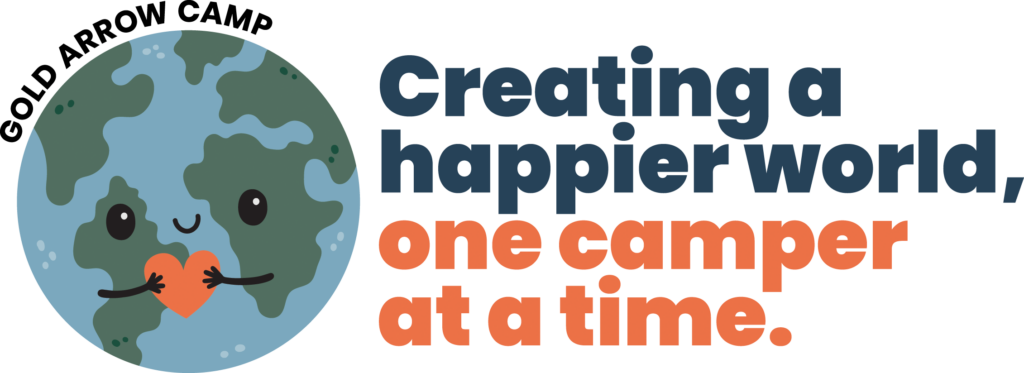
Join Sunshine, Chelster, Gem & Delta for a chat about Gold Arrow Camp’s Vision, Mission, Goals. Learn about the positive habits and character traits we want our campers and staff to take with them far beyond their time at camp. Learn WHY Gold Arrow Camp exists and about the vision we have of creating a happier world, one camper at a time.
Watch a video about Gold Arrow Camp here.
Learn more about the Gold Arrow Camp philosophy here.
Hear what campers say about GAC here.
Podcast Credits
Music by Henry “Dobro” Johns
Narration (intro & outro) by Henry “Bravo” Pederson
Produced by JRS Production Creative Audio
Podcast: Play in new window | Download
Subscribe: Spotify | Email | RSS
Episode 78: Creating a Happier World with Speed

This week on the Gold Arrow Camp Podcast, Sunshine chats with Armando “Speed” Negrete about the lasting positive impact of his experience as a GAC staff member in the late 1990s and early 2000s. The communication and leadership skills he learned at GAC are professional skills Armando uses today as a Lead Public Safety Dispatcher (9-1-1), a track and cross country running coach, and a sports photographer. Armando also shares about how the skills he learned and practiced as a Group Counselor are ones he still uses and benefits from as a parent.
“I remember how incredibly in awe I was of the camp ground,
of all the different activities that Gold Arrow Camp offers.
I was just completely awestruck.”
Armando “Speed” Negrete
Article about Armando’s return to Fresno State to get his Bachelor’s Degree
Podcast Credits
Music by Henry “Dobro” Johns
Narration (intro & outro) by Henry “Bravo” Pederson
Produced by JRS Production Creative Audio
Podcast: Play in new window | Download
